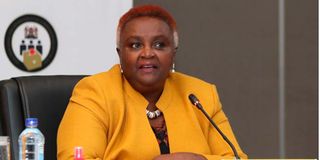Mbogori’s 2013 row with Cord returns to haunt her in quest for IEBC job

Kagwiria Mbogori during the interview on July 15, 202.
When lawyer Kagwiria Mbogori served as chairperson of the Kenya National Commission on Human Rights, she became embroiled in a dispute with the Coalition for Reforms and Democracy (Cord), an alliance formed by Raila Odinga, Kalonzo Musyoka and Moses Wetang’ula to contest the 2013 elections.
That controversy came back to haunt her when she appeared before the selection panel interviewing candidates for four positions on the Independent Electoral and Boundaries Commission (IEBC).
After the elections, Cord filed a petition to remove her from KNCHR, arguing that she was partisan, had abandoned her independence and was supporting the government and IEBC in situations where the agency was not fair and just.
Responding to the panellists about the episode, Ms Mbogori said she sincerely felt that Cord could have done better to avert the violence that erupted in the lead-up to the elections.
“There was a lot of violence and I made it known. When I did, I met the leadership of Cord and we reached a decision to have political parties and ourselves thrash out a standard operating procedure for demonstrations and protests,” he said.
“It involved the Inspector-General of police to avoid carnage and violence against innocent citizens whenever protests were held.”
Based on the nullification of the 2017 presidential elections and the resigning of four IEBC commissioners, a panellist sought to find out whether she thought Cord was right in fighting for the disbanding of IEBC.
“I never faulted Cord for speaking out, but I feel that political parties have to take responsibility as well so that if I’m a member and organise a protest we need to do it peacefully as allowed by law,” she said.
“My reaction then was not wrong. As a national commission, our work is to serve all Kenyans. We had a lot of hue and cry from Kenyans from all walks of life, and we were constantly being asked whose rights we were protecting.”
She added: “We stood up to ensure that people couldn’t get hurt and lose property. Our elections and politics shall have matured if in future we are able to disagree without hurting each other. If I join the IEBC I would not feel differently.”
Questioned about IEBC’s blunders in past elections, she pointed out delayed ballot papers and polling stations opening late, besides missing names in the voter register and yet voters said they had registered.
“We were observers and had established a liaison with IEBC, so we called to report challenges at different polling stations as we encountered them. We did not wait to finalise the election,” she said.
Ms Mbogori spoke about her passion for women’s rights and her experience as a member in a gender violence programme, saying women experience gender violence in election periods. This, she said, prevents them from participating in campaigns and elections for political positions.
“The abuses tend to have a sexual innuendo. They are shamed in public, which translates to intimidation. There is also shaming, rumours and anonymous flyers with unprintable words,” she said.
She also said women contenders are harassed with the intention of forcing them to abandon the competition altogether.
“They also experience physical assault in the form of unwarranted physical touch. As if that is not enough, sexual assault sometimes takes place and women are raped. It is worse immediately (after) an election because there is always a group celebrating while the one defeated is up in arms, and women are the soft tissue that get crumpled in between,” she said.
Violence against women, she said, is due to bad behaviour and hooliganism.
“It’s not in African culture to abuse and mistreat women. During elections there is lawlessness and the weaker people in the society are the ones who suffer,” she said.
“In the 2013 elections polling stations were almost a no-go area. Political party primaries were shambolic due to irregular registers, and very few women participated because of how chaotic and violent they were.”
To quell electoral violence, she said, IEBC needs to start enforcing compliance with electoral laws before elections are due.
“If I’m appointed, I will make sure every political party adheres to the Electoral Offences Act by first making them aware of what the offences are. I would also like to understand why very few people are prosecuted for electoral offences,” she said.





